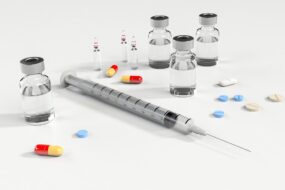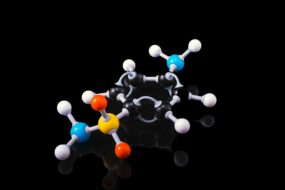Vancomycin is a glycopeptide antibiotic discovered as a penicillin substitute.
Indication.
- Used against MRSA, Strep. viridans, Enterococcus and Cl. difficile.
- Bactericidal action is exerted on gram-positive cocci, Neisseria, Clostridia and diphtheroids.
- Gram-negative bacilli are non-responsive to the drug.
Mechanism of action.
- Inhibits synthesis of bacterial cell wall hence cell lysis and death.
- It is bactericidal.
Resistance.
- Due to plasmid-mediated alteration of the dipeptide target site, hence a decrease in the affinity for the drug.
Adverse effects.
- Nephrotoxicity and ototoxicity.
- Super infections, vertigo and tinnitus.
- Skin allergies include rashes, chills and fever.
- Decreased blood pressure during intravenous injection.
- Red man syndrome due to rapid intravenous injection causes chills, fever, urticaria and intense flushing.
- Neutropenia, thrombocytopenia and eosinophilia.
Clinical uses.
- The second choice drug to metronidazole for the antibiotic-associated pseudomembranous enterocolitis caused by C. difficile and given orally (125–500 mg 6 hourly).
- Staphylococcal enterocolitis is an indication of oral vancomycin.
- Alternative drug for serious skin, soft tissue and skeletal infections caused by gram-positive bacteria.
- They are used in dialysis patients and those undergoing cancer chemotherapy.
- They are used against Penicillin-resistant pneumococcal infections and infections caused by diphtheroids.
- The preferred surgical prophylactic in MRSA prevalent areas and penicillin-allergic patients.
Dosage.
- VANCOCIN-CP, VANCOGEN, VANCORID-CP 500 mg/vial injection.
- VANCOLED 0.5, 1.0 g injection.
- VANCOMYCIN 500 mg tablet.
- VALID 250 mg capsules, 500 mg/vial injection.













